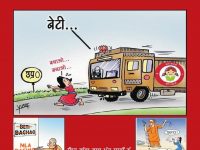The General Council of All India Kisan Mazdoor Sabha (AIKMS) began in Berhampur on July 30, 2019 at 11 am. A total of 101 delegates and 25 invitee delegates from 7 states participated. While the registration of delegates, distribution of stationery and badges had started from morning, the GC began with the flag hoisting of AIKMS flag by Senior Vice President, Comrade Sushanto Jha. Immediately as the flag rose and the rose petals descended, the delegates raised slogans hailing the red flag and the sacrifice of martyrs, while Arunodaya team from Andhra Pradesh led by Comrade Sriniwas sang a song with the same message.
Thereafter the delegates entered the hall and National Secretary, Comrade Bhalchandra invited the AIKMS central executive members, the Chairman of the Reception Committee, advocate Bhagwan Sahu, the Chief Guest, Prof. Gokul Bihari Nath and editor of Samdrushti, Sri Sudhir Pattnaik to the dais. Along with handing over the proceedings to comrade S. Jha, who presided over the proceedings in the absence of AIKMS president, com. V Venkatramaiah, he sought approval of the house for naming the venue after Comrade Rajendra Shadangi and the dining place after Comrade Jacob Rait.
Comrade JV Chalapati Rao and Dharampal Singh presented the martyrs resolution and a 2 minute silence was observed in their memory. Thereafter the songs in memory of martyrs were rendered by Comrades Sriniwas and Dharampal and the house raised an applause with slogans.
The proceedings of the General Council began with Sri Bhagwan Sahu, welcoming the delegates by presenting narratives of struggles of landless peasants in Ganjam district where the event was taking place. He said that a number of peasants had attained martyrdom in their struggles for land in Ganjam/Berhampur area. Death has never deterred them from sustaining the struggle though the crisis today has depended further.
There after the chief guest, Dr. Golak Bihari Nath, a renowned pro-people economist and retired Professor of Economics from Kalinga university rose to speak and greeted the delegates with a warm Red Salute.
He began by saying that the country today is facing its worst economic slowdown with unemployment at all time high, inequality rising, PSUs on sale, health, education and railways being handed over to MNCs and the corporate taking over agriculture. Unable to stop the decline the govt is trying to polarize society, increase jingoism, attack minorities and dalits through cow vigilantes and demoralize intellectuals by charging them of being Urban Naxal. When 49 intellectuals wrote to the PM against communal attacks, he countered this with 62 intellectuals criticizing them. It is a hay day for the RSS, VHP and BJP as RSS pracharaks are on all significant decision making positions of the President, Vice President, Prime Minister, Home and Defence Minsiters.
Highlighting the agrarian crisis, he said agriculture contributes just 14% to India’s GDP while 60% of the people depend on it. It is the mainstay of peoples’ income, employment and food security. While the disparity between agriculture and industry is rising, it is leading to higher unemployment and disguised unemployment as there is not enough land with people to work on. The main reasons for decline in agriculture, he said are rise in input costs with no commensurate rise in crop value and fall in income. A major reason for this is that the govt is just not procuring enough. This is making agriculture unviable and now suicides have increased to cover all states of India.
He said that in 1947 the main slogan for agriculture was land to the tiller. The govt was forced to implement land reforms. What it implemented was removal of intermediary tenures, granting security of tenures, placing a ceiling on land ownership and distribution of ceiling surplus land. But security of tenure, ceiling and distribution were not completed in any state and only intermediaries were removed. He laid emphasis that land is not just an economic issue, it is a political issue and we must treat it as such.
He said tenancy operations, share croppingare present in all states of the country. This he said is a semi feudal relationship. Now the govts are stopping distribution of land to the poor and are continuing tenancy and developing contract farming. Vinoba Bhaveand Bhoodanwere brought in only to betray the Telangana Movements’s demands. Even in West Bengal land distribution happened only partly.
Later, he said that in the 1960s, the govt of India shifted from structural reforms in agriculture to technological transformation, ie. HYV seeds, chemical fertilzers, insecticides, drawing water, using machinery, all part of the Green Revolution. The benefit of this went to the landlords and the rich peasants, as it is they who were able to increase land under their control and the poor did not have any land to be able to benefit from this change. In this the main crops promoted were paddy and wheat, not others. After some time the production started stagnating and output fell. At this time it was realised that the soil had been destroyed by the use of chemicals. Though the benefit of this had gone to MNCs, now again newer seeds, GM seeds are being promoted by them in the name of addressing this crisis. They are also promoting Green Revolution in the eastern states despite it having failed in Punjab, Haryana, Maharashtra and AP.
Now that old seeds are not working well, market driven economic growth is being promoted in which external factors matter most, he said. The benefit of this will again go to MNCs dealing with these inputs, like Monsanto, Walmart, Bayer, and other MNCs. Along with this, subsidies for peasants are being reduced, PSUs are being sold off in the name of flow of capital and technology. He said the private sector is being promoted, grain markets are being deregulated for MNCs to buy from open markets, role of FCI and PDS is being reduced, all of which are leading to increase in peasant crisis. Peasants are deserting farming and unfortunately many of them do not have land to fall back upon. In recent times he said distress sale of almost all crops have impacted the economy of peasants and in some areas they have been risen in struggle.
Criticising the Modi govt he said that though it had promised C2 plus 50% as the MSP of all crops, fact is that it told the Supreme Court that assuring this MSP will distort markets. He said the govt has repeatedly told lies to the parliament that it is giving 50% more than the costs. Now, faced with the protests it is effectively saying that though it will not give MSP, it shall pay a Bhavantar, i.e. to compensate the deficit in price below the floor price. He said govt interventions of Kalia, RytuBandu and PMKisan are all small economic interventions which cannot solve the agrarian crisis. We must understand this is a political crisis.
Talking about peasant indebtedness, he said that while in 2003, 47% peasants were indebted, in 2012-13 more than 61% were in debt. Of the states, the highest indebtedness is in AP, followed by states of Punjab, TN, Kerala, Karnataka and Maharashtra. He said this has led to a massive increase in role of private moneylenders and the private business lenders, who deal not only in selling inputs, but also in purchasing crops. With this they control all agricultural operations. Earlier, he said, the govt used to do much of this. Now the landlords, rich peasants, middle class, traders and MNCs dominate over water regulation, markets, seeds, labour and credit.
With regard to infrastructure building, he said, while the govt is building SEZs, damns, airports, ports, highways, urban settlements and acquiring land for it, it is changing the Land Acquisition Act of 2013 which was a result of peasant struggles. Today 70% of the displaced persons are uprooted due to big dams and of them 40% are tribals. The price of this development is being paid by the poor, tribals and Dalits.
He said the question of forests is a state subject, not a central subject and the govt is its owner. But for the govt now it is a source of revenue, not a source of preserving India’s environment, ecology, biodiversity and life and livelihood of the poor people. The govt is unwilling to abide by the FRA, 2006 and it wants to uproot the tribals and Other Traditional Forest Dwellers. It is totally undermining the rights of Gram Sabhas under the PESA Act.
The govt launched the PM FasalBima Yojana with much fanfare, but its plan is only to benefit the private companies, not the peasants. In the name of farmers, govt funds are being diverted to private companies. It is using PMFBY as a slogan to divert attention from peasant demands for reducing input costs, granting MSP at 50% more than C2 and for procuring all crops. Its slogan for Doubling Farmers Income by 2022 is a complete fraud and now it is postponing even this target by talking about New India by 2025. He said BJP keeps winning despite this cheating because all other parties also have nothing material to offer to the peasants.
Finally, he exhorted the delegates to carry forward the great banner of the struggles which we have inherited from our predecessors, the Great Telangana Armed Struggle, the Tibhaga Struggle and the Naxalbari Armed Peasant Struggle. He said the success of the recent workers strike in January, which was preceded by the massive mobilizations of peasants in Mumbai and then in Delhi in November has shaken the ruling setups. Wider unity of peasant organizations is the need of the hour. The demands of land, irrigation, MSP, security of tenure, FRA implementation, employment to rural poor are all on the agenda of struggles now. But peasants are being politically divided along party lines and hence nothing is coming out of this. He also said peasants are divided along demands raised by the leaders of the rich sections, the rich peasants and the landlords like Sharad Joshi and Tikait and the other working sections, the small, marginal and middle peasants and the landless.
He said our fight for peasants must have an agenda and that should include the demands of ceiling on land holdings, distribution of ceiling surplus land, to drive out the landlords and the corporate from agriculture, the implementation of the FR, the rights for share croppers and the security of tenure for them. Land struggle, he said is a political struggle and peasants must understand the need for this. The ideological and political basis for this can only be ML politics, with its anti colonial, anti imperialist, anti feudal struggles. This needs to be advanced. He said without a ideology we cannot advance and we must remember what Marx said, “Working people of the World Unite, You have Nothing to Lose”.
A brief translation of his speech was done by Sri Raja Suresh, President of Humanist Rationalist Organization of Brahmapur.
Editor of Samdrushti, Sri Sudhir Pattnaik also addressed the delegates briefly. He said that de-politicization of agrarian issues by itself is a political act, which is disempowering peasantry by making them dole dependent. He said that land reforms have not been implemented because it was never the agenda of those who came to power after the British left. We must understand that we have no control over our own labour, simply because we do not have land and we have to labour on land which belongs to others.
He said that technological changes have further upset structural issues by widening inequality since those who had access to capital, they only could benefit. He emphasised that one should not give up struggle for land, as land has been targeted by big players across the globe. Once corporate entities acquire land, its values increases hundred to 5 hundred times, as it has been seen in Kalingnagar and elsewhere. Thus, under valuing one’s own land strengthens the corporate agenda for maximizing their value once it comes in their possession and the perpetuation of destitution among peasantry continues.
He explained that those who own small and marginal land holdings, are not the real owners of land, as they become slaves to the market and financial institutions. Right from buying seeds, fertilizers, chemical pesticides to that of availing machines, tractors, harvesters etc. market decides their choices and options. Therefore, he explained that even transfer of land to tiller does not provide effective ownership as market and money control everything.
He decried ruling classes for selling 30,000 varieties of Indian paddy to foreign powers and eroding our own seed wealth. Now we are dependent on them for seeds, which we owned at one time. For all inputs we are now dependent on markets controlled by the corporate. This does not matter to the rich, but the poor are always at their mercy. Because of this condition of dependence on inputs, the govt is able to promote corporate dominated contract farming now.
He ended by asking the delegates to pay serious attention to these questions.
After this session, the delegates dispersed for lunch and reassembled at 3 pm. The GS first presented the report, mainly its political part. The report had already been received by all delegates in time, though translations in Telugu, Bengali and Odiya were not available. The main emphasis of the report was on the changes that had taken place since III conference held in April 2016. It summed up the present conditions of land ownership, the conditions of rural employment and wages, including wages of women, the attack on tribals and FRA,changes in land acquisition laws and rules, facts relating to PDS, Mnrega and Pensions, loan waivers, the impact of GST and demonetization, the launch of various schemes of the central govt and the facts relating to them – PMFBY, Jandhan, JAM, DFI, Ramesh Chandra Committee report and Doubling Farmers Income, Swaminathan Committee report and MSP debate, the crisis which befell sale of several crops, formation of FPOs, ODF and SBA, the direct income schemes and the changes in agriculture related laws to help corporate penetration.
The report also covered detailed activities of the Central Executive Committee, in short the State Executive Commitees and the important struggles. The most significant of these have been the resistance of tribals in Telangana against eviction, the struggle for Dalit lands in Punjab, the joint movement with other peasant organizations against loan recovery and our participation in the All India Kisan Sangharsh Coordiation Committee.
The report mainly drew lessons to lay emphasis on land and wage struggles, on building peoples’ struggles against semi feudal exploitation and building resistance struggles, on improving organizational functioning, on conducting objective surveys to study class contradictions in rural areas, amongst others.
There after the presidium allotted 7 hours time to delegates to express their views, with a maximum of 10 minutes to each speaker. A total of 25 delegates spoke, laying suggesting changes and enriching the discussion. Comrade JV helped with the translations. Thereafter the report was approved unanimously by the house next day after full and proper discussion.
Just as the report was being approved news of martyrdom of Comrade Linganna came in and after announcement of the details, the house paid homage to his contribution to the movement and observed a silence for 2 minutes.
Thereafter resolutions were presented and approved unanimously. Com K Rangaiah presented the resolution on Attacks on Tribals and OTFD; Com Tarsem Peter on Rural debts, distress, suicides; Com Rambriksh Ram on Conditions of agricultural labour; Com Shambhu Prasad on the attack on Unnao Rape Victim; Com Bhalchandra Sarangi on intensifying Communal and Caste Attacks; Com Sudhakar on changes in Industriallabour laws; Com Sushanto Jha on changes in UAPA, NIA and repression on people and one on hailing contribution of comrade Charu Mazumdar on his 100th birth anniversary; Com Dharmapal on Increasing penetration of corporates in agriculture;
Then the General Council took up the agenda of filling its vacant positions and unanimously approved Comrade Jatinder Singh of KKU, Punjab as member of CEC.
And finally,the Council adopted a call for struggle on the eviction of tribals and other attacks on peasantyr, beginning with a two week campaign on August 9, the World Adivasi Day and culminating with protests at district headquarters.


